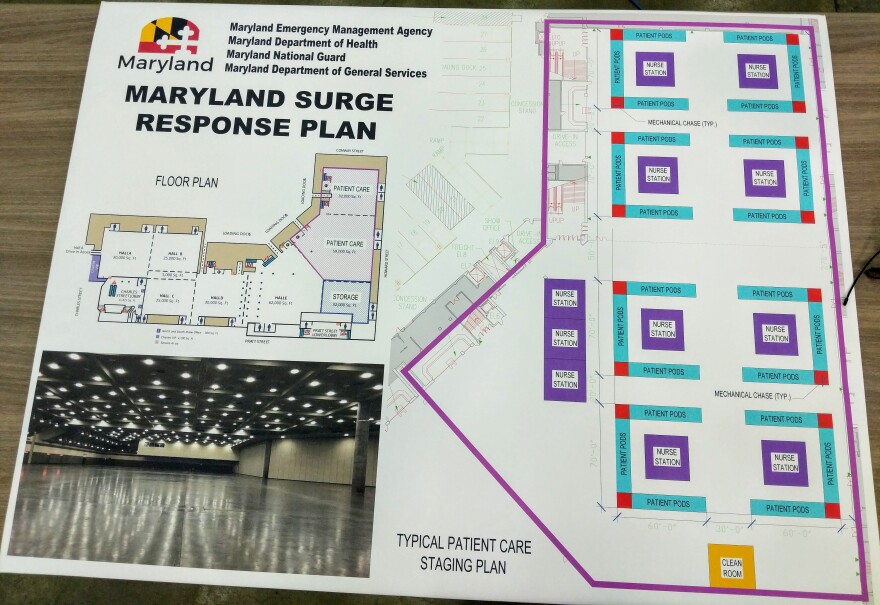Gov. Larry Hogan and Baltimore Mayor Jack Young got a preview on Tuesday of plans for a field hospital at the Baltimore Convention Center. The site’s initial 250 beds are part of a larger plan to increase hospitals’ capacity in the face of rapidly rising coronavirus infection rates.
The goal is 6,000 beds more than Maryland hospitals already have. Hogan said he arrived at that number — a number he called “mind-boggling” — based on what doctors and other experts said could be the need in the worst-case scenario.
Hogan said he plans to achieve that goal in phases.
First, hospitals can free up 900 beds by forgoing elective surgeries and rearranging their existing facilities.
After that, the plan turns to facilities like the one being created at the Convention Center and to closed hospitals. Hogan said he hopes to have the now-closed Laurel Regional Hospital reopened sometime next month, adding another 135 beds.
At the Convention Center, the initial 250 beds will be arranged in U-shaped “patient pods,” each with a nurse’s station at the center.

“We want to divert people away from the emergency departments,” said Maryland Department of Health Chief Operating Officer Dennis Schrader. “If the emergency medical system arrives at a home and somebody is ill but not ill enough to go into a bed in a hospital, we need some place for them to go, they would come here.”
The current plans only use about 100,000 square feet — about a third of the available space on the Convention Center’s ground floor. Schrader said if they need to add more beds, they can.

Ellington Churchill, secretary of the state Department of General Services, said the Convention Center will provide food. He said the Hilton Baltimore Inner Harbor Hotel next door may also figure in.
“Medical staff, first responders, as well as those that are coming off of the end of their care could use that for housing,” he said.
Hogan told the officials at Tuesday’s site visit that the state needs everything set up as quickly as possible because it’s hard to know how soon they will need it.
“I obviously want to see it done yesterday,” Hogan said to laughs. “I know you’re working as fast as you can, but it’s not fast enough.”
The state is waiting on the Federal Emergency Management Agency, or FEMA, to deliver the beds. Hogan said those could arrive in the next few days.
He also acknowledged that getting enough hospital beds solves just part of the problem. Maryland, like every other state, is grappling with a global shortage in supplies, namely personal protective equipment for healthcare workers and ventilators for patients who can’t breathe on their own.
“We’re working on it from every angle, from getting our own supplies from places like China and Korea to producing supplies here in our state, buying things on the open market across the country, and pushing to get more of this stuff from the federal government,” Hogan said.
He said the lack of sufficient equipment and also of healthcare workers to treat a potential spike in patients underscore the importance of preventing that spike from happening.
“We can’t have these spikes and this demand on the healthcare system and not have enough healthcare workers and enough emergency room beds and enough ICU beds and enough of all those things,” he said. “That’s what everybody’s afraid of. We don’t want to be Italy, and we don’t want to be New York or California or the state of Washington.”
To ensure there are enough medical staff to care for a surge in patients, Hogan said, the state called up three Medical Service Corps of the National Guard, activated the Medical Reserve Corps, and waived state requirements for doctors licensed in other states. The state is also authorizing for work retired doctors whose licenses have expired.







